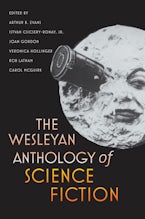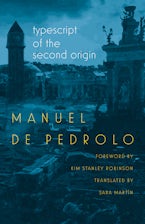
The Wesleyan Anthology of Science Fiction
Edited Arthur B. Evans, Istvan Csicsery-Ronay, Joan Gordon, Veronica Hollinger, Rob Latham , Carol McGuirk
Sales Date: 2010-08-01
792 Pages, 6.12 x 9.25 in
The best single-volume anthology of science fiction available—includes online teacher's guide
The Wesleyan Anthology of Science Fiction features over a 150 years' worth of the best science fiction ever collected in a single volume. The fifty-two stories and critical introductions are organized chronologically as well as thematically for classroom use. Filled with luminous ideas, otherworldly adventures, and startling futuristic speculations, these stories will appeal to all readers as they chart the emergence and evolution of science fiction as a modern literary genre. They also provide a fascinating look at how our Western technoculture has imaginatively expressed its hopes and fears from the Industrial Revolution of the nineteenth century to the digital age of today. A free online teacher's guide at http://sfanthology.site.wesleyan.edu/ accompanies the anthology and offers access to a host of pedagogical aids for using this book in an academic setting.
The stories in this anthology have been selected and introduced by the editors of Science Fiction Studies, the world's most respected journal for the critical study of science fiction.
Introduction
CHRONOLOGICAL LISTING OF STORIES
Nathaniel Hawthorne, "Rappaccini's Daughter" (1844)
Jules Verne, from Journey to the Center of the Earth (1864)
H. G. Wells, "The Star" (1897)
E. M. Forster, "The Machine Stops" (1909)
Edmond Hamilton, "The Man Who Evolved" (1931)
Leslie F. Stone, "The Conquest of Gola" (1931)
C. L. Moore, "Shambleau" (1933)
Stanley Weinbaum, "A Martian Odyssey" (1934)
Isaac Asimov, "Reason" (1941)
Clifford D. Simak, "Desertion" (1944)
Theodore Sturgeon, "Thunder and Roses" (1947)
Judith Merril, "That Only a Mother" (1948)
Fritz Leiber, "Coming Attraction" (1950)
Ray Bradbury, "There Will Come Soft Rains" (1950)
Arthur C. Clarke, "The Sentinel" (1951)
Robert Sheckley, "Specialist" (1953)
William Tenn, "The Liberation of Earth" (1953)
Alfred Bester, "Fondly Fahrenheit" (1954)
Avram Davidson, "The Golem" (1955)
Cordwainer Smith, "The Game of Rat and Dragon" (1955)
Robert A. Heinlein, " 'All You Zombies—'" (1959)
J. G. Ballard, "The Cage of Sand" (1962)
R. A. Lafferty, "Slow Tuesday Night" (1965)
Harlan Ellison, "'Repent, Harlequin!' Said the Ticktockman" (1965)
Frederik Pohl, "Day Million" (1966)
Philip K. Dick, "We Can Remember It for You Wholesale" (1966)
Samuel R. Delany, "Aye, and Gomorrah . . ." (1967)
Pamela Zoline, "The Heat Death of the Universe" (1967)
Robert Silverberg, "Passengers" (1968)
Brian Aldiss, "Super-Toys Last All Summer Long" (1969)
Ursula K. Le Guin, "Nine Lives" (1969)
Frank Herbert, "Seed Stock" (1970)
Stanislaw Lem, "The Seventh Voyage," from The Star Diaries (1971)
Joanna Russ, "When It Changed" (1972)
James Tiptree Jr., "And I Awoke and Found Me Here on the Cold Hill's Side" (1972)
John Varley, "Air Raid" (1977)
Carol Emshwiller, "Abominable" (1980)
William Gibson, "Burning Chrome" (1982)
Octavia E. Butler, "Speech Sounds" (1983)
Nancy Kress, "Out of All Them Bright Stars" (1985)
Pat Cadigan, "Pretty Boy Crossover" (1986)
Kate Wilhelm, "Forever Yours, Anna" (1987)
Bruce Sterling, "We See Things Differently" (1989)
Misha Nogha, "Chippoke Na Gomi" (1989)
Eileen Gunn, "Computer Friendly" (1989)
John Kessel, "Invaders" (1990)
Gene Wolfe, "Useful Phrases" (1992)
Greg Egan, "Closer" (1992)
James Patrick Kelly, "Think Like a Dinosaur" (1995)
Geoff Ryman, "Everywhere" (1999)
Charles Stross, "Rogue Farm" (2003)
Ted Chiang, "Exhalation" (2008)
THEMATIC LISTING OF STORIES
Alien Encounters
C. L. Moore, "Shambleau" (1933)
Stanley Weinbaum, "A Martian Odyssey" (1934)
Arthur C. Clarke, "The Sentinel" (1951)
Robert Sheckley, "Specialist" (1953)
Robert Silverberg, "Passengers" (1968)
Nancy Kress, "Out of All Them Bright Stars" (1985)
Gene Wolfe, "Useful Phrases" (1992)
James Patrick Kelly, "Think Like a Dinosaur" (1995)
Apocalypse and Post-apocalypse
H. G. Wells, "The Star" (1897)
Fritz Leiber, "Coming Attraction" (1950)
Ray Bradbury, "There Will Come Soft Rains" (1950)
J. G. Ballard, "The Cage of Sand" (1962)
Octavia E. Butler, "Speech Sounds" (1983)
Misha Nogha, "Chippoke Na Gomi" (1989)
Artificial/Posthuman Life-forms
Nathaniel Hawthorne, "Rappaccini's Daughter" (1844)
Isaac Asimov, "Reason" (1941)
Alfred Bester, "Fondly Fahrenheit" (1954)
Avram Davidson, "The Golem" (1955)
Brian Aldiss, "Super-Toys Last All Summer Long" (1969)
Ursula K. Le Guin, "Nine Lives" (1969)
Ted Chiang, "Exhalation" (2008)
Computers and Virtual Reality
Philip K. Dick, "We Can Remember It for You Wholesale" (1966)
William Gibson, "Burning Chrome" (1982)
Pat Cadigan, "Pretty Boy Crossover" (1986)
Eileen Gunn, "Computer Friendly" (1989)
Evolution and Environment
Jules Verne, from Journey to the Center of the Earth (1864)
Edmond Hamilton, "The Man Who Evolved" (1931)
Clifford D. Simak, "Desertion" (1944)
Frank Herbert, "Seed Stock" (1970)
Charles Stross, "Rogue Farm" (2003)
Gender and Sexuality
Leslie F. Stone, "The Conquest of Gola" (1931)
Frederik Pohl, "Day Million" (1966)
Samuel R. Delany, "Aye, and Gomorrah . . ." (1967)
Pamela Zoline, "The Heat Death of the Universe" (1967)
Joanna Russ, "When It Changed" (1972)
James Tiptree Jr., "And I Awoke and Found Me Here on the Cold Hill's Side" (1972)
Carol Emshwiller, "Abominable" (1980)
Greg Egan, "Closer" (1992)
Time Travel and Alternate History
Robert A. Heinlein, " 'All You Zombies—'" (1959)
Stanislaw Lem, "The Seventh Voyage" from Star Diaries (1971)
John Varley, "Air Raid" (1977)
Kate Wilhelm, "Forever Yours, Anna" (1987)
John Kessel, "Invaders" (1990)
Utopias/Dystopias
E. M. Forster, "The Machine Stops" (1909)
R. A. Lafferty, "Slow Tuesday Night" (1965)
Harlan Ellison, "'Repent, Harlequin!' Said the Ticktockman" (1965)
Geoff Ryman, "Everywhere" (1999)
War and Conflict
Theodore Sturgeon, "Thunder and Roses" (1947)
Judith Merril, "That Only a Mother" (1948)
William Tenn, "The Liberation of Earth" (1953)
Cordwainer Smith, "The Game of Rat and Dragon" (1955)
Bruce Sterling, "We See Things Differently" (1989)
Acknowledgments
Further Reading
ARTHUR B. EVANS is a professor of French at DePauw University. He has published numerous books and articles on Jules Verne and is the general editor of Wesleyan University Press's Early Classics of Science Fiction book series. ISTVAN CSICSERY-RONAY JR. is a professor of English at DePauw University and the author of The Seven Beauties of Science Fiction (Wesleyan, 2008). JOAN GORDON is a professor of English at Nassau Community College and coeditor of several volumes of scholarly essays on science fiction. VERONICA HOLLINGER is a professor of cultural studies at Trent University in Peterborough, Ontario and the coeditor of Queer Universes: Sexualities in Science Fiction (2008). ROB LATHAM is an associate professor of English at the University of California, Riverside, and author of Consuming Youth: Vampires, Cyborgs, and the Culture of Consumption (2002). CAROL MCGUIRK is a professor of English at Florida Atlantic University and is widely published in eighteenth-century studies and Romanticism.
""[I]f the story is good people will flock to it. This seems to be the operative philosophy of The Wesleyan Anthology of Science Fiction.""
~Alan Bisbort, Sunday Republican
"No institutional library should be without this truly phenomenal volume, and non-academic readers will greatly appreciate the bargain-basement price on the trade paperback edition."
~Publishers Weekly
""It's an absolutely knockout collection that belongs on ever serious collector's shelf.""
~John O'Neill, Black Gate Magazine
""The stories in The Wesleyan Anthology of Science Fiction reveal modern, written sf to be a mature, flexible, often sophisticated way to tell tales whose concerns are those of realistic literature but whose focus is on the impact of science and technology. The Wesleyan Anthology succeeds brilliantly.""
~Michael A. Morrison, World Literature Today
""[I]t comes closer to perfection than any single-volume collection of science fiction short stories I have seen. The six editors have selected the contents with care, highlighting the heterogeneous nature of the field in almost every respect, from gender and race to subject matter and stylistic approach.""
~Paul Witcover, Locus
""[W]hat has notably been missing is an anthology that bridges the gap between the classroom and the general reader, a book that is both an excellent teaching tool and a pretty good overview of the field for SF Readers who began their reading in the 1980s or later. The Wesleyan Anthology of Science Fiction is very nearly that book, and is almost certainly the most useful SF teaching and historical anthology now available.""
~Gary K. Wolfe, Locus magazine
""This anthology offers an overview from the works of Nathaniel Hawthorne and Jules Verne to those of William Gibson - so thorough with its brief, informative analyses at the start of each story, reading this collection is like taking a course without the bother of tests.""
~Eve Ottenberg, Washington City Paper
""No institutional library should be without this truly phenomenal volume, and non-academic readers will greatly appreciate the bargain-basement price on the trade paperback edition.""
~Publishers Weekly
""This big book is both a thrilling and entertaining and a convincing argument for the way SF can refresh the mind, play boldly with form and reflect its era creatively – in other words, what all good literature should do.""
~Ed Park, Los Angeles Times
"This is an excellent collection of one of world literature's greatest treasure troves: the science fiction short story in English. The stories form a kind of history of the genre, and are a continuous reading pleasure."
~Kim Stanley Robinson, author of the Mars Trilogy and The Years of Rice and Salt
"The key word here is megatext. The Wesleyan Anthology presents the best sample from today's sf megatext—the 'fictive universe that includes all the sf stories that have ever been told,' as the Wesleyan's editors neatly put it—that I could imagine fitting between two covers. Every story feels necessary to the whole. And the whole is a lure for readers, for teachers who want to inspire their classes, for all of us who care about understanding the turbulent world about us.""
~John Clute, editor of The Encyclopedia of Science Fiction



